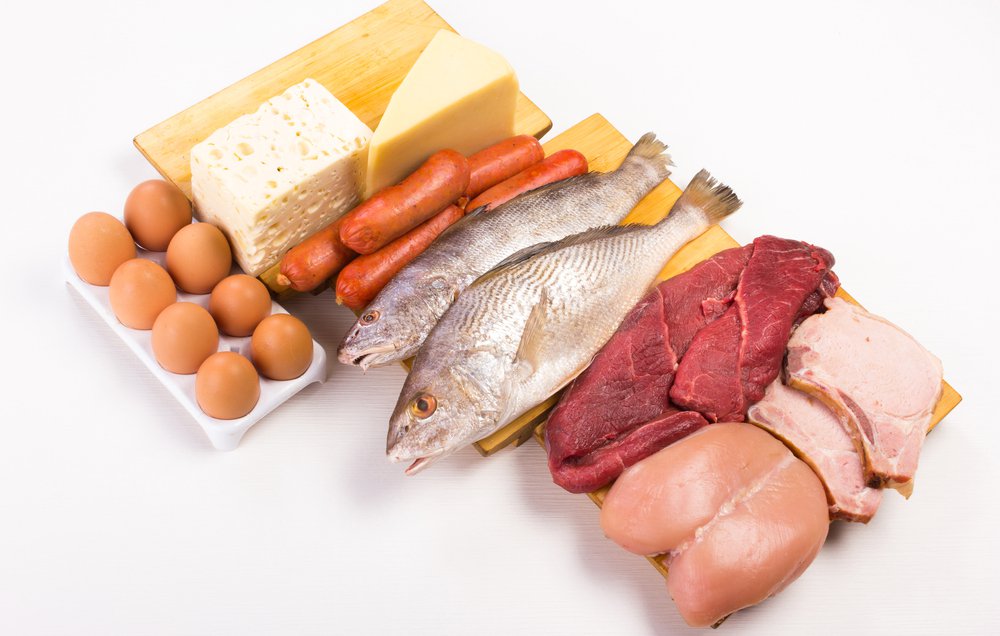Do You Really Need All That Protein?

By:
You know the feeling. You've just finished a long workout, you're on the go, and you want to replenish your body's nutrients so your muscles can heal and grow.
That's where protein powders comes in. In theory, the powdered supplements combine with a liquid base to funnel a needed boost of important muscular building blocks to your tired body.
But are these powders really necessary? And if so, who needs to use them— and how often?
Proteins are indispensable to life.
Proteins, the highly diverse biomolecules which regulate cellular reactions, work to rebuild muscle after workouts by the process of protein biosynthesis. When you work out, you tear your muscle tissue. When the tissues heals, it becomes stronger— because the proteins that help the muscles adapt to the tearing also have to become stronger in reaction to the stress of working out. Essentially, your internal protein biosynthesis is bulking up while you bulk up.
Proteins are found in many foods.
Animal products like meat, dairy, and eggs are packed with protein. And proteins are also found in vegetables, most notably in peas, soybeans, spinach, kale, mushrooms and more.
Enter: protein powders. They concentrate the proteins found in these foods and deliver the benefits of proteins without the carbohydrates and fats.
 Mens Health - menshealth.com
Mens Health - menshealth.com
Know your protein powder: whey, soy, and others
Whey powder is one of the most used protein supplements because it dissolves easily into water and is relatively tasteless. A leftover liquid from cheese production with a low fat content, whey is popular with bodybuilders and athletes.
Soy protein offers the benefits of the powder to vegan and lactose intolerant people who want to avoid whey. It also provides an alternative for those who prefer a lighter diet with less dairy. The powder doesn't dissolve as well into water, though, and has a reputation of not tasting so great.
The other main types of protein powder include casein (another milk byproduct), pea, egg, hemp, and plant mix protein powders.
Is protein powder right for you?
Well, for starters, they're not meal replacements. Protein powders are very specific use supplements that are adjacent to proper nutrition. They shouldn't be confused with protein heavy meal replacements— they're no substitute for healthy eating.
And some experts say that using protein powders without working out can lead to weight gain, loss of muscle, and kidney strains.
“Protein powders are not really necessary if you have access to a normal, healthy diet,” Carole Conn, associate professor of nutrition at the University of New Mexico, told WebMd in 2011.
But, she added, protein powders can have some great benefits for people whose diets are restricted.
Barbara Lewin, a dietitian and sports nutritionist, concurred with this assessment and noted that teenagers, people recovering from injuries, bodybuilders, and adults beginning new workouts are among the limited groups that should use the powders, she said.
Lewin also included vegans and vegetarians in this group, because of the potential lack of protein in a diet without meat or animal products.
“All of those are valid reasons for trying to get more protein into your diet, and protein powders are one way to do that,” Lewin told the website.
It's unclear how much protein powder really helps
Tests and studies are divided on whether protein powders are particularly helpful for building muscle.
"A study published in 2012 in the 'American Journal of Clinical Nutrition' found that protein supplementation triggered muscle growth and promoted strength gains after resistance exercise in older as well as younger participants," Clay McKnight reported in SFGate.
And Tara Collingwood, the Orlando Magic's team dietitian, told Fox News Lifestyle that in her experience, the protein powders were a useful tool for aiding muscle growth.
“I like the versatility of protein powders and the fact that you can get so much protein at one time,” said Collingwood.
But Mandy Enright, a yoga teacher and registered dietitian nutritionist, disagreed.
“Protein powder doesn’t have any magical powers when it comes to weight loss or muscle building,” Enright told Fox News Lifestyle.
And a 2014 study from the National Center for Biotechnology Information supported Enright's assertion.
"High quality and consistent data demonstrated there is no apparent relationship," the report reads, "between recovery of muscle function and ratings of muscle soreness and surrogate markers of muscle damage when protein supplements are consumed prior to, during or after a bout of endurance or resistance exercise."
The Mayo Clinic struck a balance between the two positions and said that while "short-term studies have suggested that whey protein increases muscle mass and strength," there are "conflicting results... in terms of whey protein's effects on body composition."
The clinic concludes that there's more work to be done before reaching a definitive answer.
When you're sippin on your protein shake and get a whole chunk of protein powder pic.twitter.com/dPEQxCYPW1
— Natalie (@nmariee5) May 12, 2017
If you're going to use the powders, be responsible
If you do fall into one of the groups that may benefit from a protein boost, Lewin recommended using the powders as small supplements throughout the day. Essentially, protein powders can be useful as long as you're careful with how you consume them— and as long as you really need them. But in any case, the best time for their use is not after a workout— that's when you need carbs, Lewin said.
"[P]rotein is also important for recovery after a workout," Lewin said, "but research shows that at that point, the body needs fuel with a 4-1 or 5-1 ratio of carbs to protein.”
Instead, Lewin recommended using fruit smoothies with yogurt or milk, or even chocolate milk.
"A glass of chocolate milk is one of the best things for recovery," she said.
